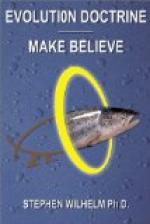The purpose of the discussions up to this point has been to present the reasons drawn from the principal classes of zooelogical facts for believing that living things have transformed naturally to become what they now are. Even if it were possible to make an exhaustive analysis of all of the known phenomena of animal structure, development, and fossil succession, the complete bodies of knowledge could not make the evolutionary explanation more real and evident than it is shown to be by the simple facts and principles selected to constitute the foregoing outline. We have dealt solely with the evidences as to the fact of evolution; and now, having assured ourselves that it is worth while to so do, we may turn to the intelligible and reasonable evidence found by science which proves that the familiar and everyday “forces” of nature are competent to bring about evolution if they have operated in the past as they do to-day. Investigation has brought to light many of the subsidiary elements of the whole process, and these are so real and obvious that they are simply taken for granted without a suspicion on our part of their power until science directs our attention to them.
For one reason or another, those who take up this subject for the first time find it difficult to banish from their minds the idea that evolution, even if it ever took place, has been ended. They think it futile to expect that a scrutiny of to-day’s order can possibly find influences powerful enough to have any share in the marvelous process of past evolution demonstrated by science. The naturalists of a century ago held a similar opinion regarding the earth, viewing it as an immutable and unchanged product of supernatural creation, until Lyell led them to see that the world is a plastic mass slowly altering in countless ways. It is no more true that living things have ceased to evolve than that mountains and rivers and glaciers are fixed in their final forms; they may seem everlasting and permanent only because a human life is so brief in comparison with their full histories. Like the development of a continent as science describes it, the origin of a new species by evolution, its rise, culmination, and final extinction may demand thousands of years; so that an onlooker who is himself only a conscious atom of the turbulent stream of evolving organic life does not live long enough to observe more than a small fraction of the whole process. Therefore living species seem unchanged and unchangeable until a conviction that evolution is true, and a knowledge of the method of science by which this conviction is borne upon one, guide the student onwards in the further search for the efficient causes of the process.




